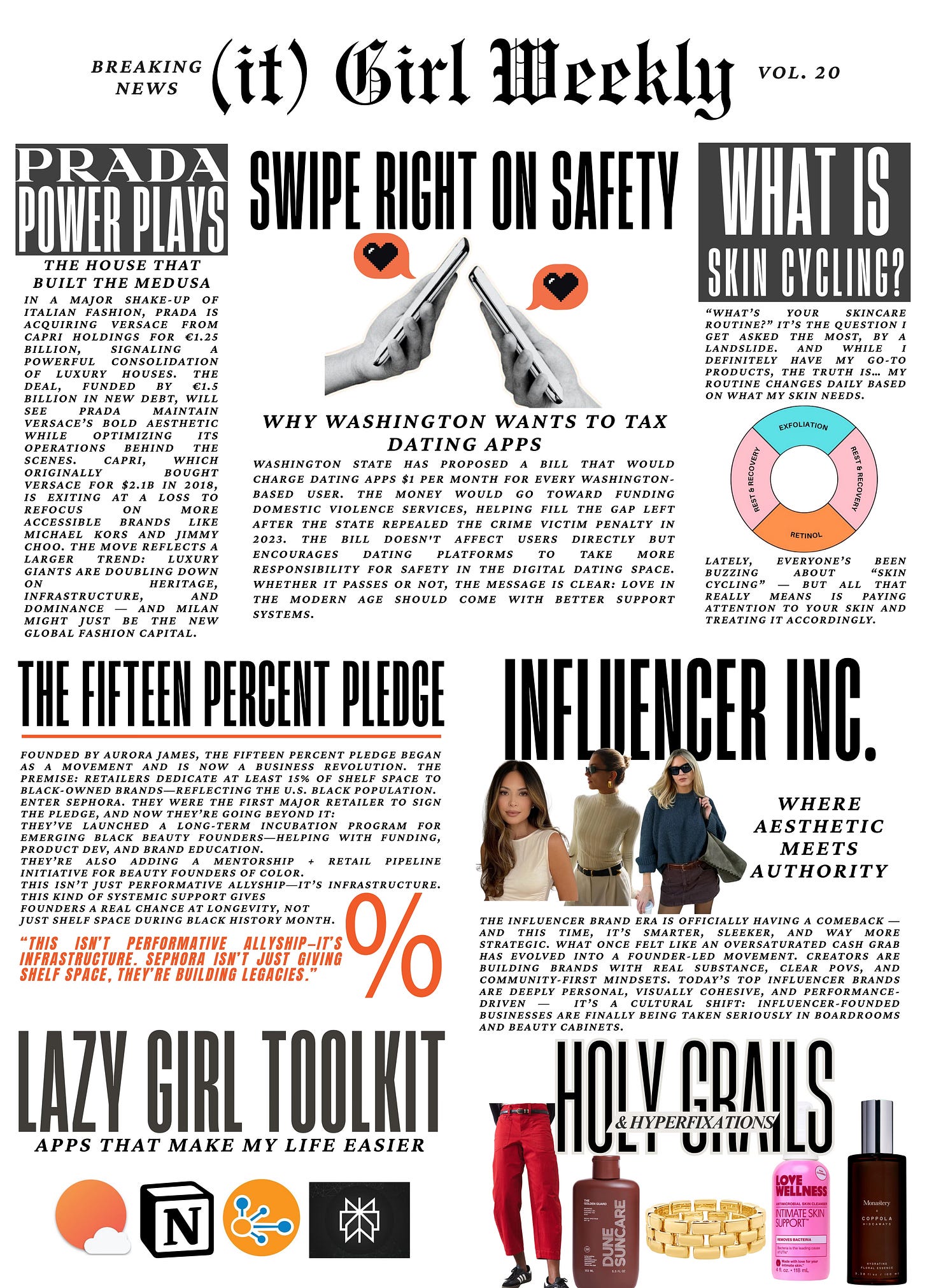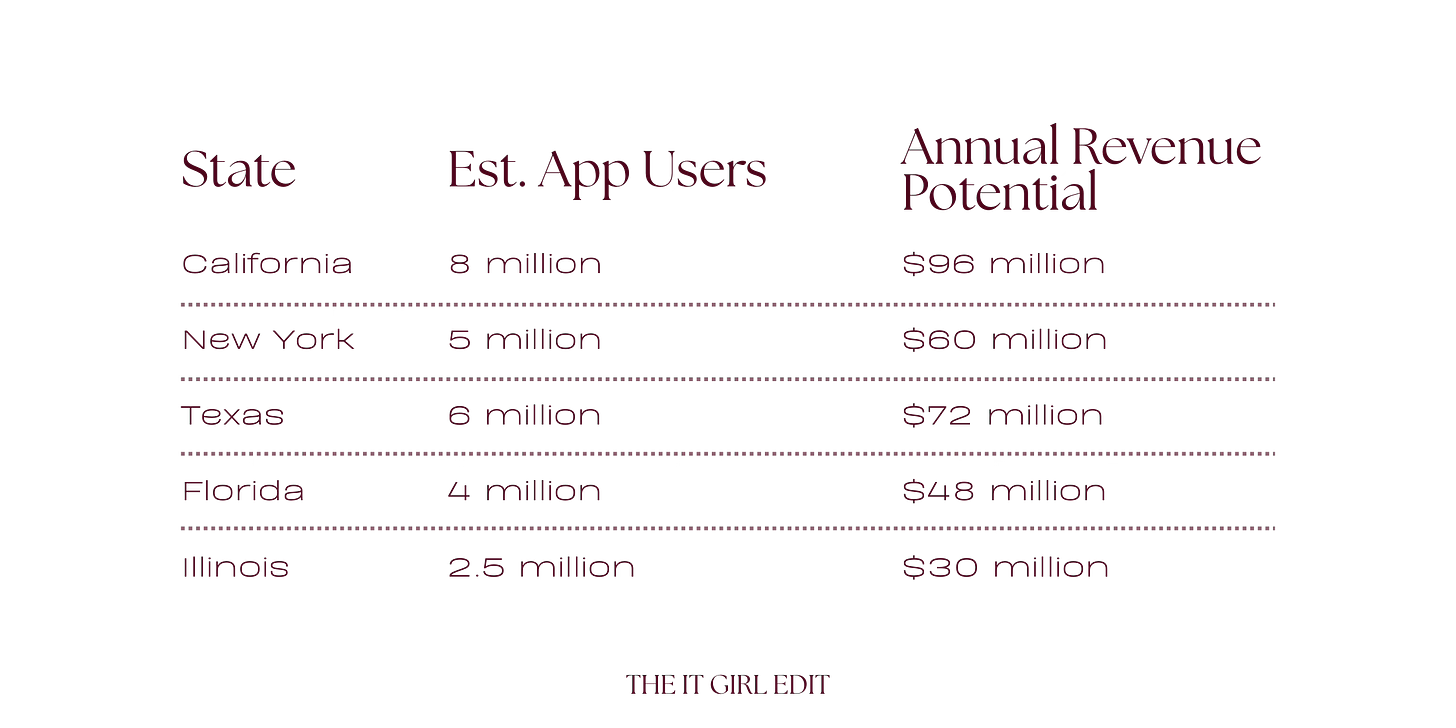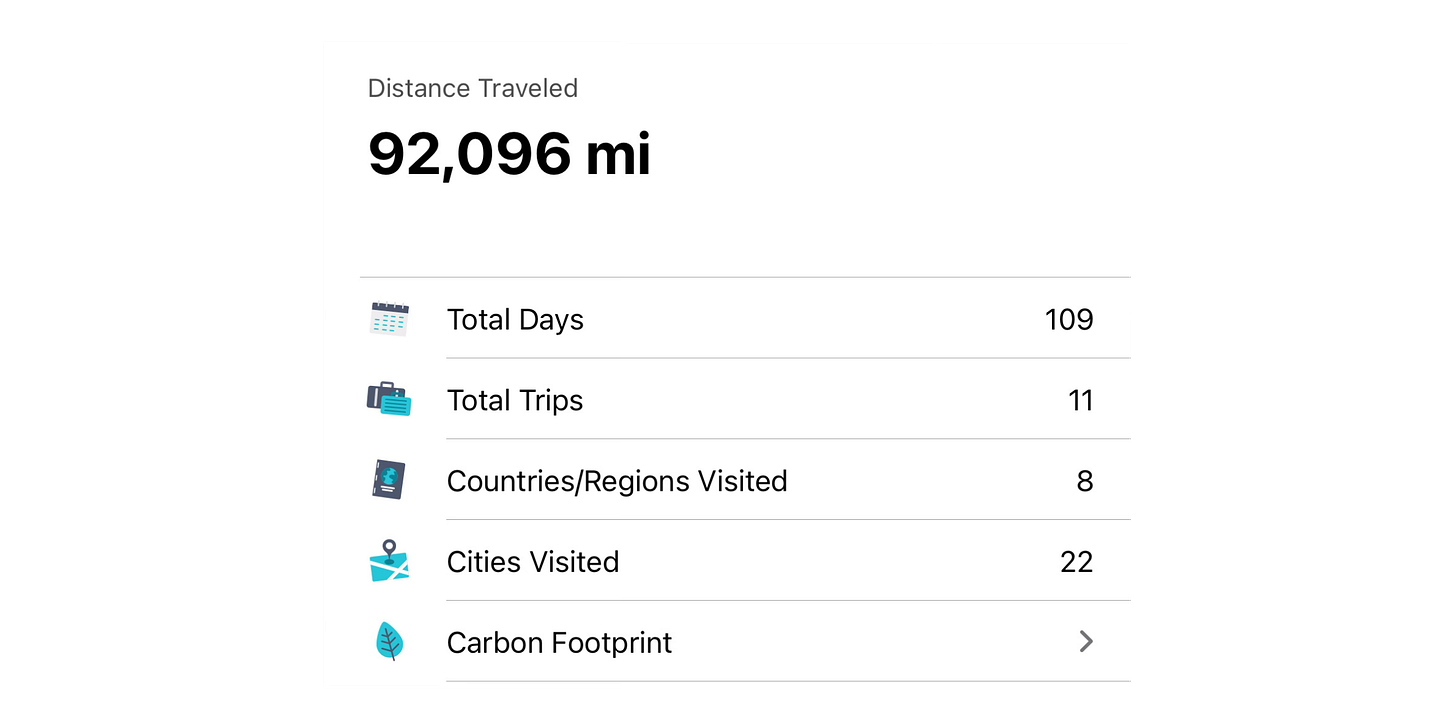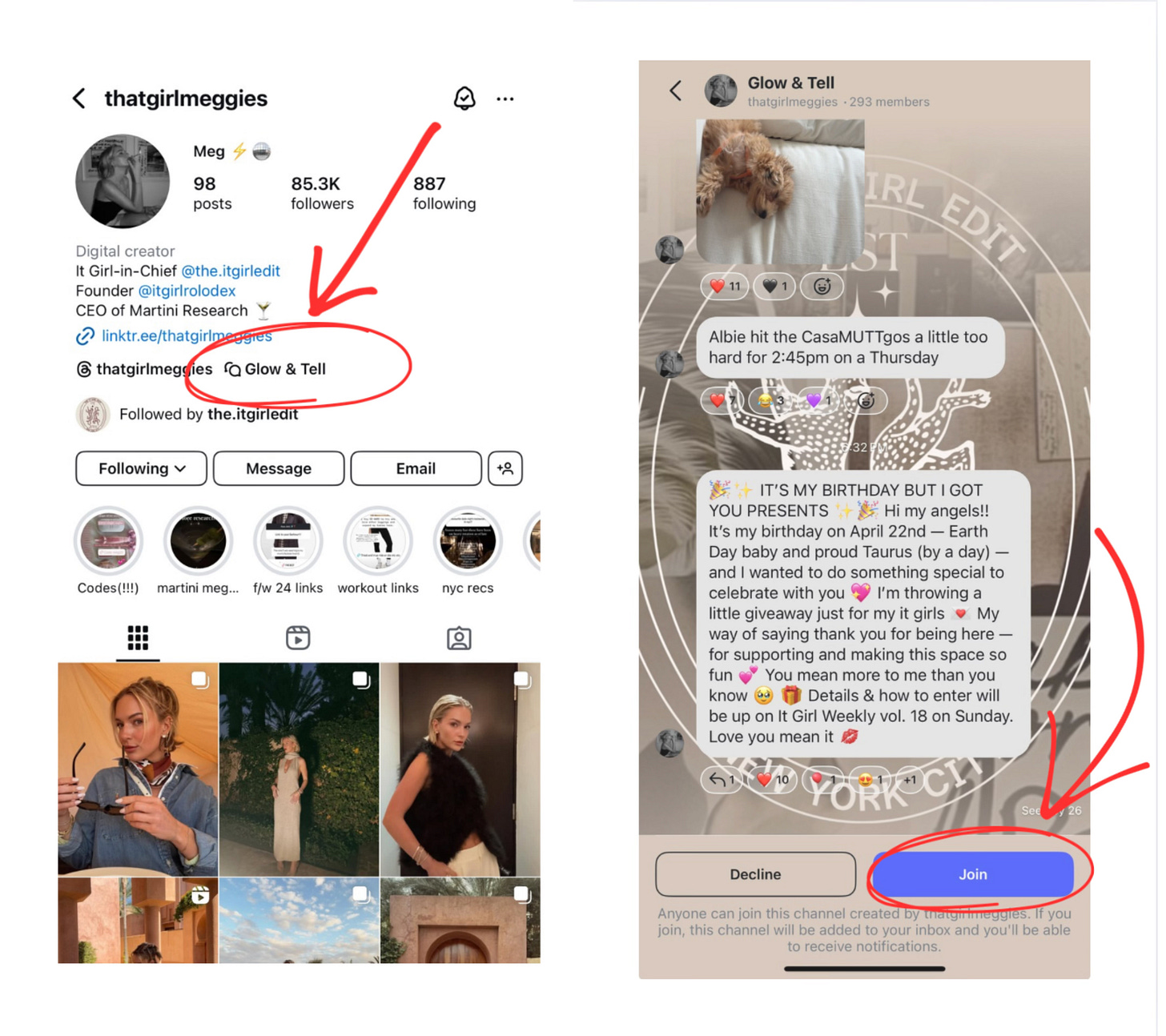It Girl Weekly vol. 20
Prada buys Medusa, The Fifteen Percent Pledge & a lesson in dating app accountability
This week somehow managed to fly by and drag on at the same time. Albie got his first professional bath (traumatizing), I had my fourth laser tattoo removal session (also traumatizing), and I officially broke up with my psychiatrist (shockingly the least traumatizing — it was long overdue).
Prada’s major acquisition has the fashion world buzzing, The Fifteen Percent Pledge is thriving, and Washington State just taught us a surprising lesson in dating app accountability.
🎂BIRTHDAY GIVEAWAY DETAILS AT THE BOTTOM OF THIS POST XX
Prada Buys Medusa
In what might be the chicest corporate takeover of the decade, Prada has officially agreed to acquire Versace from Capri Holdings for €1.25 billion ($1.375 billion USD). The deal will close in the second half of 2025, marking a massive shift in Italian luxury with the union of two of the most iconic brands under one umbrella. It’s giving fashion dynasty consolidation.
Pulling back the curtain: The acquisition is being financed by €1.5 billion in new debt (because what’s a little financial drama without a bridge facility?), including a €1 billion term loan and a €500 million bridge loan. Basically, €1 billion that they'll pay back over time (like a regular loan), and €500 million as a short-term loan to cover things quickly while they finalize everything else. It's like using a mix of a long-term mortgage and a credit card to buy something expensive.
Prada plans to preserve Versace’s signature bold and gold identity with the familiar Medusa heads, safety pins, and slinky gowns, while applying its own behind-the-scenes expertise to finally see the brand scale.
But what’s just as interesting is who’s walking away from the table. Capri Holdings, who bought Versace back in 2018 for $2.1 billion, is now selling it at a massive loss. The funds will go toward strengthening its financials and hopefully growing its other holdings, ie. Michael Kors and Jimmy Choo. In other words: Capri Holdings is going “accessible”.
This deal might be showing a broader trend in the fashion world: luxury houses are tightening their circles, looking for long-term heritage, and building up their infrastructure to weather whatever the world economy throws next. It’s also a signal that Italian luxury, in particular, is playing to win.
Chess, not checkers.
The Fifteen Percent Pledge, 4 Years Later
Founded by Aurora James, the Fifteen Percent Pledge began as a powerful Instagram post and quickly snowballed into a full-blown movement. The ask was simple yet seismic: if Black people make up 15% of the U.S. population, why aren’t they reflected on 15% of our shelves? From there, the Pledge became a rallying cry for accountability in retail — one that’s now reshaping entire business models.
Enter Sephora. The beauty giant was the first major retailer to sign on, and they didn’t stop at checking a DEI box. They’ve turned the Pledge into a business imperative — a long-term commitment that’s evolving into real infrastructure.
✨ Here’s what they’re doing now:
Incubation Program specifically for emerging Black beauty founders — offering funding, product development resources, and hands-on brand education. Think of it as a full startup accelerator, but with contour kits and clear gloss.
Mentorship + Retail Pipeline initiative for beauty founders of color, helping them not only get in the door but stay there — and thrive.
Why it matters
Shelf space isn’t enough if you don’t have the tools to succeed once you're there. This is about building equity, not just exposure. It’s a shift from performative allyship to institutional change — the kind that can rewrite what generational wealth, ownership, and success look like in the beauty industry.
Sephora is proving that when big brands align their money (and mentorship) with their values, it creates ripple effects far beyond a single pledge.
🔗 FIFTEEN PERCENT PLEDGE
The Fifteen Percent Pledge website isn’t just a mission statement — it’s a full-on discovery hub. Their searchable database makes it easy to find and shop Black-owned brands across fashion, beauty, home, and more.
Swiping Right on Safety
Why Washington Wants to Tax Dating Apps
File this under headlines that made us pause mid-scroll: Washington state has just proposed a bill that would tax online dating apps $1 per month per Washington-based user.
But before you roll your eyes at yet another government tax, here’s the heart of it:
That dollar isn’t disappearing into the void. In theory, it would go directly into a newly established Domestic Violence Services Account, funding critical programs and support for victims of abuse.
This comes after the state rolled back the Crime Victim Penalty in 2023, which used to be a fee collected from those convicted of crimes. The CVP helped bankroll victim advocacy efforts, but since then, those services have taken a major hit — layoffs, underfunded shelters, and survivors being left without support.
State Rep. Lauren Davis, who helped create the bill, says this tax is meant to pick up where the CVP left off. She also made an important (and sobering) point: while dating apps are not to blame for abuse, they’ve become a common way for people to meet — and that can lead to dangerous situations.
So, what does this mean for you? Not much in terms of usage — the bill targets the platforms themselves, not the users. But it does ask major tech companies to take a little more responsibility in a space they profit massively from. There's a good chance they'll sneak this into a “Terms & Conditions” update you’re definitely not reading. And if you’re already paying for a subscription… are you really going to notice a $1 bump?
Whether or not this bill passes, hopefully it's a powerful reminder that modern love — and modern safety — are deeply intertwined. Swipe with away, and support systems matter.
It's a bold move, and one that other states (and countries) should be watching closely. As tech continues to outpace policy, we need legislation that acknowledges the realities of modern dating and the safety issues that come with it. If a single dollar from the platforms profiting off our swipes can help protect someone in crisis, then maybe it’s time the rest of the world took note.
Back of the napkin math:
Washington has ~1.5 million dating app users. That’s conservative — but we’ll break it down:
WA population: ~7.8 million
Assume ~25% are active dating app users (ages 18–50+, singles, etc.)
That’s ~1.5 to 2 million users total.
In short:
$1/user/month × 1.5M users = $1.5 million/month
$1.5M × 12 months = $18 million/year for domestic violence support programs — in just Washington.
Here’s a rough idea of yearly potential (assuming a similar $1/user/month structure and user base %):
Even smaller states pulling in $5–10M per year could make massive strides in funding shelters, support services, survivor housing, therapy access, and more.
Apps like Tinder, Hinge, Bumble, etc. operate in 190+ countries, many of which are grappling with serious domestic violence issues and underfunded social services. If even a fraction of them adopted similar legislation, the impact could be profound.
Skin Cycling 101
💌 You’re getting a two-for-one today. I had to pull my very detailed (and maybe slightly unhinged) skin cycling routines out of the main newsletter — it was getting way too long.
So I gave them their own spotlight ✨ Full breakdown, product recs (and a full product shopping guide), and all my best tips are waiting for you.
For the skincare-obsessed, click below to dive in xx
Skin Cycling 101
“What’s your skincare routine?” It’s the question I get asked the most, by a landslide. And while I definitely have my go-to products, the truth is… my routine changes daily based on what my skin needs. Lately, everyone’s been buzzing about “skin cycling” — but all that really means is paying attention to your skin and treating it accordingly.
Influencer, Inc.
I’m not going lie… for a while it felt like the era of the influencer brand was kind of… over? The market was saturated, the drops felt soulless, and every new launch was met with "ugh, another one?". But lately the vibes have shifted. Influencer brands are back, baby — and they’ve had a glow-up.
Influencer-founded brands are stepping up with a lot more polish, strategy, and self-awareness. Gone are the days of slapping your name on a white label product and hoping it sells. Today’s influencer CEOs are building businesses with actual depth: community-first brands, tight product development, and a clear-as-day POV. It’s giving founder era, not just content creator trying to cash in.
Here’s the thing: when done right, influencer brands are actually magic. Who knows their audience better than someone who’s literally talking to them every single day? Who can test, tweak, and perfect a product better than someone who’s been sent 5,000 versions of the same serum and knows exactly what’s missing? Influencer brands today are driven by creators who understand the holy trinity: performance, aesthetics, and vibes.
We’re seeing this with brands like Summer Fridays, Annablue, Aureum Collective, and Renggli Studios — all of which feel personal, dialed-in, and deeply rooted in their founders’ identities. They’re not just selling product. They’re selling an experience. And whether that is glowy skin, effortless hair, or ethically made belts, it’s one we’re dying to be part of.
And, of course, there’s something deeply feminist about it. For so long, influencer culture was dismissed as frivolous — as if it’s not hard work to build a community, shape culture, and convince thousands of people to buy a blush because it makes your cheekbones pop. These women are now building brands that investors take seriously. And that’s a shift worth celebrating.
🔗 SHOP MY FAVORITE PIECES FROM INFLUENCER BRANDS
My Digital Dream Team: 7 Apps I Can’t Live Without
Perplexity AI
If ChatGPT, Google and Wikipedia had a brainy baby
My pocket-sized research assistant. Perplexity gives me real, cited answers — no more doom-scrolling through Google results or Reddit threads trying to find something credible. It’s perfect for when I want smart summaries or deep dives without getting a headache.
Sunsama
Chef’s kiss for time-blocking.
Sunsama lets me drag tasks into my calendar so I can actually see where my time is going. It syncs beautifully with my other tools I use (Google Calendar & Notion) and helps me to plan realistic days. My favorite part? How easy it is to pop a quick “to-do” into the task list — no more losing them in the depths of my notes app.
I keep it as my calendar widget on my home screen and use its customizable push notifications to keep me on task.
Notion
My brain, but cuter and more organized. I use Notion for everything from planning launches, writing and organizing everything for The It Girl Edit to journaling and tracking goals. It’s endlessly customizable and so aesthetic it makes me want to be productive. Once you learn how to use it, you’ll never look at a regular notes app gain. It’s my life hub.
Croissant
Croissant makes reselling clothes effortless by offering guaranteed buyback prices while you shop. The browser extension (partnered with retailers) locks in a five-year resale value at checkout.
I have the extension on my phone and my computer every time I online shop, I’m able to see exactly how much I’ll be able to resell a piece for.
Major plus: Croissant keeps track of your purchases through email integration so you can track your closet (and your spending… ugh).
Expensify
The only reason I don’t cry while organizing receipts. Expensify auto-scans, categorizes, and generates expense reports with scary good accuracy — perfect for freelancers or anyone with a messy digital wallet. It makes reimbursements and budgeting feel slightly less soul crushing. A must-have if you ever utter the words “write-off.”
TripIt
The type-A travel girlie’s best friend. TripIt pulls all your confirmation emails and creates a master itinerary — flights, hotels, rental cars, dinner reservations, all in one neat timeline. Bonus: it syncs to my calendar, so I never miss a beat (or a boarding time).
I love the data — it tracks how many miles I’ve flown each month, year, and since I first started using it. It also logs countries visited, days spent traveling, and even breaks down my carbon footprint, with tips on how to offset it.
🎂 BIRTHDAY GIVEAWAY
In true it girl fashion, I’m celebrating my birthday by spoiling YOU 💋
I’m hosting a little giveaway to say thank you — for reading, for supporting, for being part of this magical and chaotic, corner of the internet we’re building together 💌
Whether you’ve been here since the very beginning or just joined the party, I’m so grateful for you. And now it’s your turn to get a present 🎁
To enter:
Follow me on Instagram @thatgirlmeggies
Join the Glow & Tell channel on my Instagram
Follow me on TikTok @thatgirlmeggies
Join the It Girl Group Chat on Substack and answer the giveaway question 🎂 (You must be a paid subscriber to access the chat)
That's it! The giveaway question is already live in the chat — I can’t wait to read your answers 💕
Winner will be announced on my birthday, April 22nd, and trust me… it’s so worth it.
To join the Glow & Tell channel on Instagram ⬇️
To join the It Girl Group Chat ⬇️
If Sephora can rewrite the rules of retail, Washington can make dating apps pay up, and influencer brands can rise from the ashes—maybe we can have it all. See you next week 💋
As ever,
xx Meg
🔗SHOP ALL PRODUCTS MENTIONED IN THIS POST
If you like what you see, consider:












